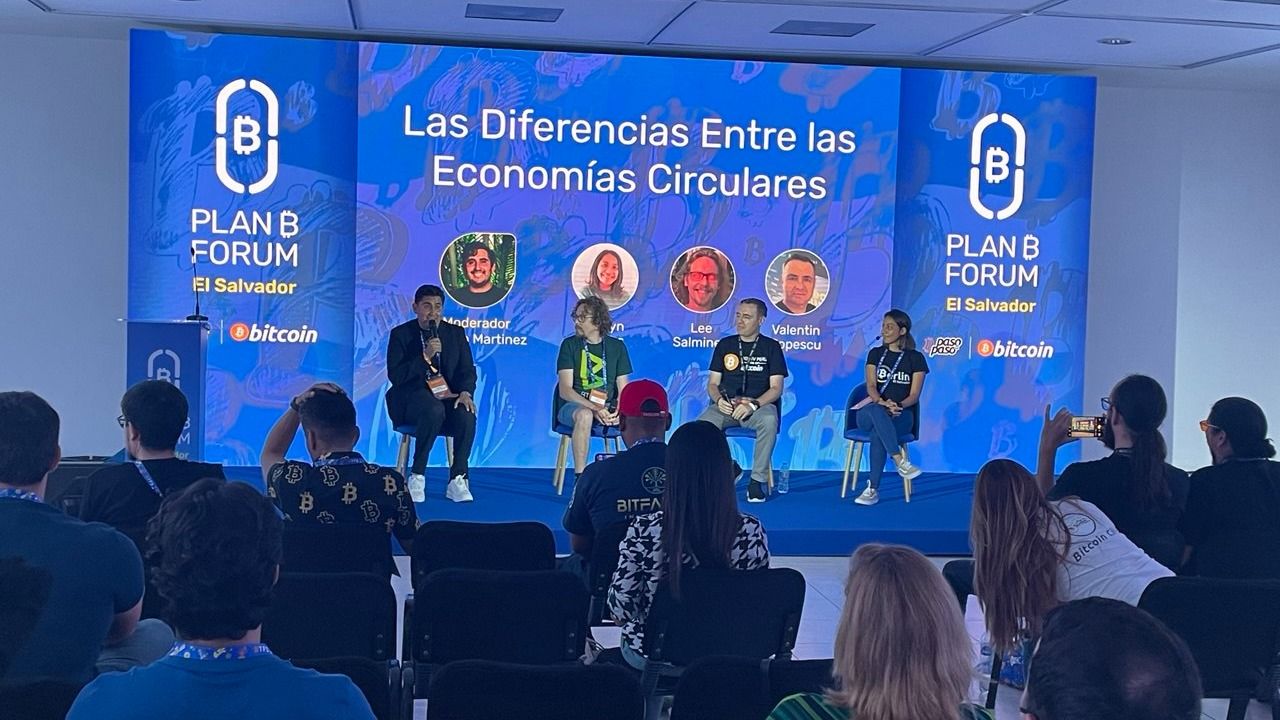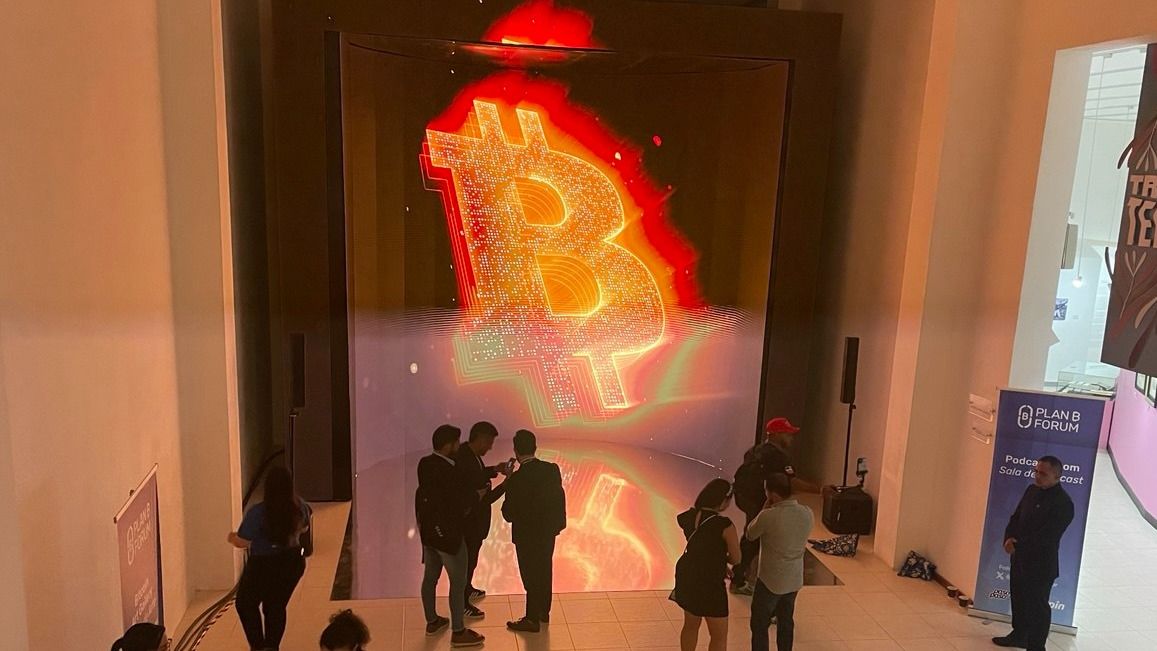🌴 “Bitcoin‘s Secret to Happiness? El Salvador’s Unlikely Path to Prosperity”

What to know:
- There was a great feeling of optimism at this year’s Plan B.
- Salvadorans are working hard to increase Bitcoin adoption.
- Differences have begun to emerge between Salvadorans and hardcore Bitcoiners, especially over President Bukele’s recent deal with the IMF.
This article is part of a four-piece series on El Salvador. You can find the previous dispatch, a story on El Zonte, here.
There was formidable energy at this year’s Plan B conference in El Salvador.
The event, which took place on Jan. 30-31, was historic for many of its 2,500 attendants. It was the first Bitcoin forum in the Central American nation to have a full dual-language agenda — meaning sessions in both English and Spanish.
For Roman Martínez, a Salvadoran co-founder of Bitcoin Beach, Plan B was a dream come true, because it enabled ordinary Salvadorans to make sense of their country’s Bitcoin experiment and ponder their own place within it.
Martínez was involved in organizing the event. The expectation, he said, was for maybe 100 to 150 Salvadorans to show up — but more than 1,500 tickets were sold to Spanish speakers.
“I’ve never seen so many Salvadoran faces at a Bitcoin conference,” he said.
The English-speaking area, located at the Sheraton Presidente San Salvador Hotel, had crypto celebrities on stage including Tether CEO Paolo Ardoino, and OGs like Samson Mow, Jimmy Song, Blockstream CEO Adam Back, and early Bitcoin developer Peter Todd.
“We are witnessing a battle between centralized and decentralized systems!” Walker America, host of THE Bitcoin Podcast, shouted at the conference’s opening panel.
Yet that side of the conference felt somewhat formulaic compared to the Spanish-speaking zone, held at the Museum of Arts of El Salvador, which was absolutely electric.
Over there, Salvadorans of all stripes outlined plans to help their country develop — from providing new educational opportunities, to mixing Bitcoin with dental care, to discussing the government’s strategy with the International Monetary Fund (IMF).
“We are in the right place in the world at the right time in history,” Gerardo Linares, co-founder of Bitcoin Berlín (the initiative behind the nation’s second Bitcoin circular economy), said to a completely bewitched audience.
“It’s all happening right here, in El Salvador.”

I asked Evelyn Lemus and Patricia Rosales, two of the Salvadorans who spearheaded the Bitcoin initiative in Berlín, what they thought of the female attendance rate.
They didn’t seem surprised.
“There is a new generation of Salvadoran women who do not depend on men,” Rosales, a single mother herself, told me.
In El Salvador, most of the time, it’s women who manage family finances.
Lemus said, “There is a lot of projects here in El Salvador that invest so much time and resources and get almost nothing in return — except tremendous pride in being able to give back to the community and support everyone else.”
Making sense of El Salvador’s situation
There was an overall feeling that El Salvador is on the cusp of entering a new phase in its Bitcoin experiment.
The last four years have seen the Central American nation, once known as the homicide capital of the world, rebrand itself into Bitcoin Country.
President Nayib Bukele, by locking up MS-13 and Barrio 18 and putting an end to gang warfare, had given El Salvador a once-in-a-lifetime opportunity to reorganize itself and attain prosperity — at least that’s how most of the people at the conference seemed to see it.
A lot of conversations revolved around the pick-up in Bitcoin adoption.
For years, despite bitcoin becoming legal tender in 2021, you could only pay for stuff with the cryptocurrency in El Zonte, the small surfing village also known as Bitcoin Beach.
In 2023, 88% of Salvadorans did not use the digital coin, according to a survey by the Central American University.
But now a second Bitcoin circular economy has been implemented in the town of Berlín, up in the mountains, and other initiatives are reportedly growing elsewhere, like in Santa Ana, the second largest city in the country.
Martínez, Lemus and Linares were all eager to share tips and advice.
The secret sauce to adoption, they said, is to mix Bitcoin initiatives with social work.
“If the way to get people to use Bitcoin was to make hamburgers instead of doing social work, then I would be making hamburgers,” Linares told me.
“Whatever works. People like social stuff, so that’s what we’re doing.”

Stablecoin giant Tether’s decision to relocate its headquarters to El Salvador was also perceived as a massive win.
Tether reported $143.7 billion in assets, including $94.5 billion in Treasury bills, in the last financial quarter of 2024.
For comparison, El Salvador’s GDP was estimated at $34 billion in 2023 by the World Bank.
Tether has become the largest company (by far) to be based in El Salvador — and other crypto firms are bound to follow in its footsteps, taking advantage of the nation’s advanced crypto regulatory framework and increasingly skilled workforce.
For Salvadorans, that means more career opportunities, higher salaries, and the possibility that the country may become a tech hub in its own right.
“El Salvador should not only be known for being the first to implement bitcoin as legal tender,” Darvin Otero, CEO of tiianki Technology, said on stage.
“Let’s change the lives of the young folks here and create the next leaders of this tech movement.”
“We have a small territory, but we can have a big dream,” Alejandro Muñoz, a Salvadoran lawyer, said.
“We can provide a big service. … Good lawyers will attract good investors and filter the scammers out.
Bright future ahead
The conference occurred only days after the government, as part of a recent multi-billion dollar deal with the IMF, rescinded bitcoin’s status as legal tender — meaning that businesses aren’t obliged to accept bitcoin payments anymore.
While some members of the Bitcoin community have accused Bukele of caving to the IMF, none of the Salvadorans at Plan B seemed to see it that way.
In their view, nothing has changed on a practical level, since the vast majority of businesses didn’t use Bitcoin to begin with.
In fact, a number of people welcomed the deal.
“El Salvador locked in long-term funding to finish the reforms needed,” Mike Peterson, an American expatriate who lives in El Zonte and co-founded of Bitcoin Beach, posted on X recently.
“The IMF loan puts the country on track to get the BBB credit rating that most sovereign wealth funds require to invest in a country.”
That’s the big difference between Salvadorans and Bitcoiners.
Hardcore Bitcoiners prioritize global adoption; they want the cryptocurrency to eventually supplant government-issued currencies, like the U.S. dollar.
For them, El Salvador is a stepping stone, the first nation to initiate hyperbitcoinization, but certainly not the last.
Salvadorans don’t have the same priorities.
For them, Bitcoin is simply a tool, a means to an end.
Their goal is to develop Salvadoran society.
“Salvadorans have always been proud of being Salvadoran. But there was a lot of pessimism.
We were never the first in anything positive, only in negative things,” Linares told me.
“Now people come from all parts of
Read More
- Best Crosshair Codes for Fragpunk
- How to Get Seal of Pilgrim in AI Limit
- Lucky Offense Tier List & Reroll Guide
- Wuthering Waves: How to Unlock the Reyes Ruins
- Enigma Of Sepia Tier List & Reroll Guide
- Are We Actually Witnessing a Crunch Time for ADA? 😲📈
- TenZ rips into Valorant’s “Power Rangers” meta and calls for CS2-inspired changes
- Final Fantasy Pixel Remaster: The Trials of Resurrection and Sleeping Bags
- Why You Might Prefer a $20 Temu Wheel for Sim Racing: A Community Perspective
- Nintendo Switch 2 logo to appear on Seattle Mariners jersey this season
2025-02-15 18:18